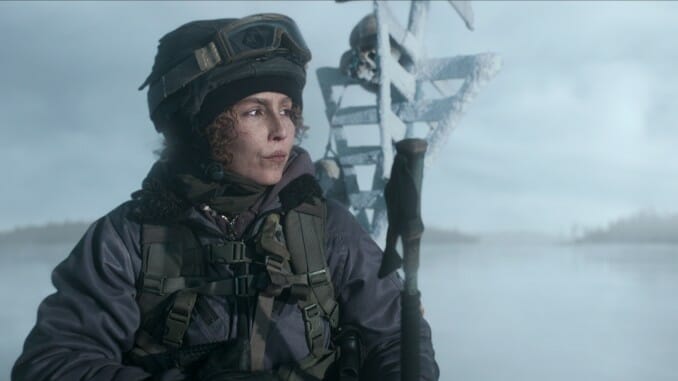Noomi Rapace Aptly Leads Dour, Trudging, Icy War Film Black Crab

General Chai Shao routed Tuyuhun forces by distracting them with dancing girls and flanking them. Harald Hardrada scorched a nigh-impenetrable Sicilian burg by tying tinder to birds, lighting them aflame and shooing them back to their urban nests. The troops of Cambyses II of Persia brought cats along with them to fight the Egyptians. War is weird. It’s in this spirit that we should take Black Crab—writer/director Adam Berg’s feature debut—the story of a conflict fought not in streets or open fields, but in ice skates across a frigid archipelago. (No musical numbers, though.)
The image of hardened soldiers casually gliding along the surface of frozen lakes is, on paper, comical. In practice it’s pretty funny, too, though the unintentional silliness wears off rapidly. Black Crab is a serious movie with little patience for goofing around. Berg opens in what looks close to the present, with erstwhile speed skater Caroline Edh (Noomi Rapace) driving her daughter Vanja (Stella Marcimain Klintberg) the hell out of Dodge. No “why” is given, but the “what” suffices: No sooner do they inch their way into a crowded road tunnel than masked men in camo gear storm the highway and gun down fleeing civilians. When the picture cuts, an unspecified amount of time has passed and Caroline is now a veteran in the post-apocalypse; Vanja is nowhere to be seen.
Black Crab uses its aesthetic of vagueness to its advantage. Berg and screenwriting partners Pelle Rådström and Jerker Virdborg (upon whose novel the movie is based) don’t try to define terms, allegiances or morality. We do not know who to consider the good guys and who to consider the bad guys. All we know is that Caroline is enlisted in the army, her enlistment is forced and her superiors believe that the war they’re fighting is nearly lost. Their final hope to snatch victory from the jaws of defeat: Assemble a crack team of elite soldiers, outfit them with MacGuffin capsules guaranteed to turn the tide and have them skate through hostile territory to “end the war.” What a pretty notion.
At this very moment, Russia’s military might is being wielded against the comparatively weak Ukrainian army by Vladimir Putin. As wars go, things don’t get as black and white as this: Putin’s a cruel tyrant with no redeeming qualities and a probable case of batshit insanity, and the New York Times’ conflict-defining photo of Tetiana Perebyinis and her two children, Mykyta and Alisa, lying dead from mortar blasts have laid bare his barbarity to the international community. Into this moment comes Black Crab, where there is neither a Putin nor a Volodymyr Zelenskyy. (There are Tetianas, Mykytas and Alisas. There are always Tetianas, Mykytas and Alisas.) If there’s a worse time for a film like this to arrive for mass consumption on the biggest streaming service out there, we haven’t gotten there.
-

-

-

-

-

-

-

-

-

-

-

-

-

-

-

-

-

-

-

-

-

-

-

-

-

-

-

-

-

-

-

-

-

-

-

-

-

-

-

-








































